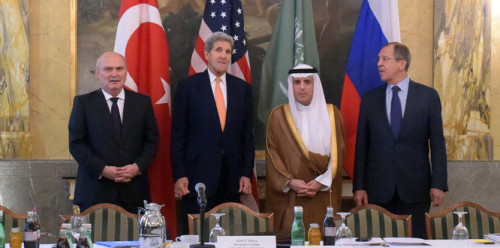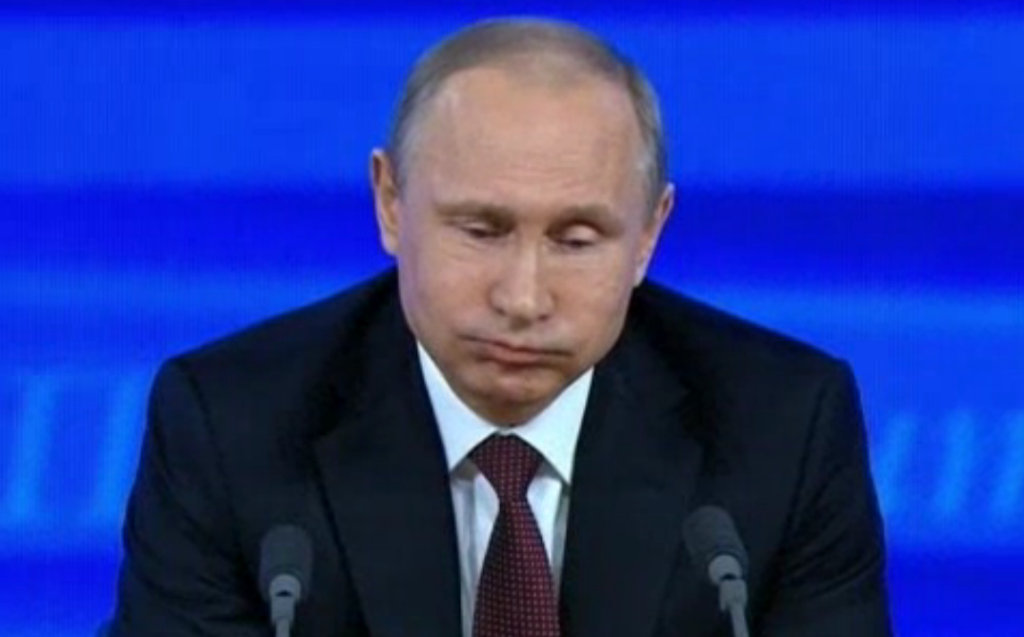PHOTO: Foreign Ministers of Turkey, US, Saudi Arabia, and Russia in Vienna on Friday (Eduard Pesov/EPA)
Written in partnership with The Conversation:
On Friday, Russia convened an international conference in Vienna, hoping for agreement that Syria’s President Assad can remain in power during a “political transition”.
After years of attempts by Moscow to gain political influence, the gathering is a victory not only for Russia’s diplomacy but for its bombing inside Syria, which began on September 30. The US, European countries, and regional states will be present. So will Assad’s ally Iran, after Washington dropped its long-standing objection to Tehran’s involvement. So will Turkey and Saudi Arabia, both dedicated foes of the Syrian regime.
If Russia can finesse this combination of countries into a resolution supporting Assad’s rule, even for the short-term, it will have turned initial triumph into an even greater achievement.
But if Moscow cannot obtain that endorsement, then it faces embarrassment and a difficult military situation. Having committed its air force and advisors to support of a six-front offensive by the Syrian military, Russia is already finding that President Assad’s forces are unable to gain much territory — and are even suffering losses in counter-offensives by both Syrian rebels and the Islamic State.
For Russian President Vladimir Putin, who has gambled that he can eclipse the US and Saudi Arabia in Syria’s 4 1/2-year conflict, breakthrough could turn quickly into quagmire.
See Syria Special: Putin Raises Stakes With Bombing, Lies, and Support of Assad
Syria Audio Analysis: Explaining the Crisis, Refugees, & Russia’s Gamble to Save Assad
Changing Politics Through Bombs
In August, Russia found its Syria strategy at a dead end. Through 2014, it has failed to make headway when it hosted meetings between Assad officials and a nominal opposition. So in 2015, Moscow — joined by the Iranians — switched to attempts to hold an international conference which would recognize the legitimacy of the Syrian regime while promising a transition in the future.
But on 11 August, Saudi Foreign Minister Adel al-Jubeir tore up the Russian script. At a Moscow press conference after meetings with Russian counterpart Sergei Lavrov, Jubeir said Assad had to leave before any negotiations could develop. Caught by surprise, Lavrov could only mutter into a live microphone, “Morons”.
Putin and Lavrov faced a political crisis. The head of Iran’s elite Qods Force, General Qassem Soleimani, had traveled to Moscow in late July to warn that the Syrian military — and thus the Assad regime — were on the point of collapse. The Saudi rejection appeared to leave no alternative to a Russian-Iranian investment of men and weapons to ensure that regime forces could hold a defense line from Latakia on the Mediterranean through Homs to Damascus.
The Russian President decided to go farther, turning adversity into a challenge to the West. Dozens of warplanes, battlefield armored vehicles, and hundreds of troops were sent into western Syria. On September 30, Russia began its bombing campaign with 80% of the attacks against Syrian rebels, rather than the supposed target of the Islamic State. A week later, the Syrian military — joined by Hezbollah, Iranian commanders and fighters, and Iraqi militia — launched the first of its six offensives across Hama, Homs, Latakia, and Aleppo Provinces.
US officials said they were surprised by the airstrikes, but Putin’s message was clear: join us in our vision of a political resolution, or face our escalating military involvement — and even the possibility that it will clash with US-led aerial operations in northern Syria.
The Russian President also gave Washington and its allies the cloak for acceptance. Even though Moscow’s first priority was to damage the rebels and blunt their threat to Assad, everyone could say that this was an effort against the menace of the Islamic State.
Within days, the gamble paid off. The US, Britain, and Germany all said that Assad could stay for up to six months while a transition was pursued. Despite Turkish President Recep Tayyip Erdoğan’s visceral hatred of Assad, Ankara followed. Even Saudi Arabia, the leading outside backer of the rebels, said that the Syrian President did not have to go immediately.
But now Moscow has to expand those statement into a firm commitment accepting Assad, not just for six months but as long as discussions over the “transition” continue. Despite their embrace of the Russian process, US officials are still staying that Assad cannot be part of Syria’s future. Saudi Arabia is adamant — either the Syrian President steps down soon, or he will be removed by military action.
That Saudi warning points to an even bigger foe for Assad and Putin: the Syrian rebels.
Russia’s Military Gamble is in Trouble
Moscow could have tailored its military intervention to holding the Latakia-Homs-Damascus defense line, using its warplanes and weapons to contain any advance by rebels who had taken much of northwest Syria during the spring and summer.
But Putin, joined by the Iranians, went farther. The Syrian military would go on the attack. It would not only try to take opposition-held pockets in Hama and Homs Provinces. It would also try to move back into Idlib Province, which is almost completely controlled by rebels. It would surround Syria’s largest city, Aleppo, which has been divided since July 2012.
Only three weeks after the launch of the offensive on six fronts — five of them against rebels, one against the Islamic State —- it is in trouble. Despite hundreds of sorties by Russian jet fighters and rocket attacks by low-flying helicopters, Assad’s forces have taken little territory and failed to capture any strategic position. In addition to regime and Hezbollah casualties, Iran has suffered its heaviest loss of fighters in the conflict, including five commanders and about 30 troops slain since 7 October.
In at least two areas, the tables have been turned on the regime and Russia. East of Aleppo, the Islamic State has seized 15 km of the main road into the city, cutting off up to 1 million people in the regime-held areas. In northern Hama Province, a rebel counter-offensive has reclaimed almost all territory and is now challenging the town of Morek, on the highway from Hama to Aleppo.
Russia and Iran are discovering that airpower cannot cover the deficiencies of the Syrian military, short of manpower and command expertise, on the ground. Having withstood the initial assaults, rebels are growing in confidence, even though they face the threat of the Islamic State as well as the regime-Russian offensives.
The situation is quickly presenting Putin with an unpalatable decision. To maintain the image of strength — and thus the pressure on the West — he may have to join Iran in committing ground forces as well as airpower to the offensives. But from the outset of its intervention, Russian officials have promised that their troops will not go onto the battlefield.
Russian President Vladimir Putin
The escape from the dilemma is success at the international conference. If the US and others accept Assad’s short-term stay, they will shield his regime from any rebel challenge — in effect, providing Damascus with the protected area that has been denied to Syria’s civilians and rebels for years.
Washington and the European powers may well choose that course. However, Saudi Arabia — and possibly Qatar — are a bigger obstacle. Claims are circulating that Riyadh has increased supplies of weapons to the rebels to meet the Russian challenge, and that it may even consider the provision of anti-aircraft missiles, previously off-limits because of US objections.
Maintaining the Illusion
Putin is receiving support from some unexpected quarters. Earlier this week, the chairman of the US Joint Chiefs of Staff, General Joseph Dunford, told a Senate hearing, “The balance of forces right now are in Assad’s advantage.”
Dunford’s statement is testimony to Washington’s confusion and detachment from the realities on the ground. But that will not bother Putin: he has already gotten the US’s tacit acceptance of his attacks on Syria’s rebels and is maintaining the pretext that this is all a fight against “terrorists” and the Islamic State.
However, inside Syria, what has always mattered more than politics is the battlefield. Contrary to Dunford’s claim, rebels have been ascendant in the northwest and areas of the south as have Kurdish forces in the northeast and the Islamic State near Aleppo and in Palmyra in the centre of the country.
Putin’s astonishing gamble has done little to reverse this situation. Going into the Vienna talks, his new bet is that he can overcome it by converting the US, Saudi Arabia, and others to the cause – a tall order, but quite possibly his only hope.
![]()


